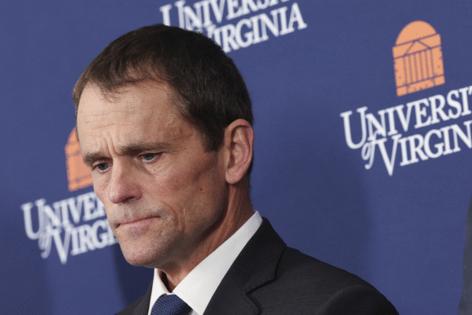UVA president says he quit instead of fighting against Trump
Published in News & Features
WASHINGTON — University of Virginia President James Ryan said he quit instead of fighting the U.S. government amid a Trump administration probe of the school’s diversity, equity and inclusion efforts.
Battling President Donald Trump would have endangered “hundreds of employees who would lose their jobs, the researchers who would lose their funding, and the hundreds of students who could lose financial aid or have their visas withheld,” Ryan said in a statement Friday.
“I am inclined to fight for what I believe in, and I believe deeply in this university,” Ryan said. “But I cannot make a unilateral decision to fight the federal government in order to save my own job.”
Ryan’s departure from Virginia’s flagship university underscores the pressure on U.S. higher education from Trump, whose administration has scrapped federal funding for Harvard University and other schools and begun investigations of colleges for “race-exclusionary” practices. Harvard has twice sued the administration.
The New York Times reported late Thursday that the Justice Department had demanded Ryan’s exit as a condition of settling a civil rights investigation of the University of Virginia’s diversity practices.
Assistant Attorney General for Civil Rights Harmeet Dhillon said the Justice Department has a zero-tolerance policy toward illegal discrimination in publicly-funded universities.
“We have made this clear in many ways to the nation’s most prominent institutions of higher education, including the University of Virginia,” Dhillon, a graduate of the institution’s law school, said in a statement. “‘When university leaders lack commitment to ending illegal discrimination in hiring, admissions, and student benefits – they expose the institutions they lead to legal and financial peril.”
The university’s rector, Robert Hardie, said he accepted Ryan’s resignation “with profound sadness” and praised his leadership.
Ryan, the school’s ninth president, developed a reputation as a champion of diversity while drawing fire from conservative alumni and Republican board members for being “too woke,” the Times said. In March, the governing board voted to abolish the school’s DEI office.
Ryan, who earned a law degree at the University of Virginia, took the reins at the institution in 2018 and previously served as dean of Harvard’s Graduate School of Education.
He said he had already decided for unrelated reasons that next year would be his last and “could not in good conscience cause real and direct harm to my colleagues and our students” for the sake of hanging on for so short a time.
“While there are very important principles at play here, I would at a very practical level be fighting to keep my job for one more year while knowingly and willingly sacrificing others in this community,” he said. “If this were not so distinctly tied to me personally, I may have pursued a different path.”
His exit adds to a parade of university presidents who have stepped down under pressure from Republicans since even before Trump returned to office in January. Several resignations occurred at private universities in the aftermath of Hamas’s deadly attack on Israel on Oct. 7, 2023, and the Jewish state’s ensuing retaliation in Gaza.
Harvard’s Claudine Gay and the University of Pennsylvania’s Liz Magill stepped down shortly after testifying before Congress in late 2023 and providing narrow legal responses to questions about whether calling for the genocide of Jews is against university policy. Two Columbia University leaders then left in less than a year over their handling of antisemitism and pro-Palestinian protests.
In a recent high-profile case involving a public institution, the University of Florida system this month rejected the appointment of Santa Ono, former head of the University of Michigan, as president of the Florida school. While Ono had been recommended by the board of trustees, the university system’s board of governors blocked his appointment over his previous support of diversity programs.
Virginia’s two senators, Democrats Mark Warner and Tim Kaine, decried the Trump administration’s intervention in the University of Virginia, which was conceived by Thomas Jefferson and founded in 1819. They called Ryan’s resignation a mistake that will hurt the state’s future.
“It is outrageous that officials in the Trump Department of Justice demanded the commonwealth’s globally recognized university remove President Ryan – a strong leader who has served UVA honorably and moved the university forward – over ridiculous ‘culture war’ traps,” they said in a joint statement.
Glenn Youngkin, the state’s Republican governor, this week appointed four new members to the board. They include a vice chairman at Goldman Sachs Group Inc. and a former chief financial officer of Carlyle Group Inc., the private equity company where Youngkin previously worked as co-chief executive officer.
“I thank President Ryan for his service and his hard work on behalf of the University of Virginia,” Youngkin said in a statement. “The Board of Visitors has my complete confidence as they swiftly appoint a strong interim steward, and undertake the national search for a transformational leader,” he wrote.
Jeri Seidman, chair-elect of the university’s senate, said she was shocked at the news and worried about what it portends for higher education.
“Every faculty member, staff, college student, parent of a college student or alumni should now be worried that the federal government can now have a say in who runs a university,” said Seidman, an associate professor at the institution’s McIntire School of Commerce. “It was Columbia, it was Harvard and it’s unclear why we were chosen. If we were chosen, then any university should be scared.”
©2025 Bloomberg L.P. Visit bloomberg.com. Distributed by Tribune Content Agency, LLC.







Comments